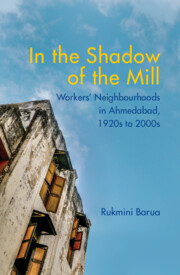Part I - Incarnations of the Political Intermediary
Published online by Cambridge University Press: 15 June 2022
Summary
An interesting place to begin our discussions on local political practices would be through an account of the daily routines of two municipal councillors from Gomtipur, a former mill area in eastern Ahmedabad. Imdad Sheikh (name changed), the Congress Party corporator from Gomtipur, was serving his third term in the AMC when I met him for the first time in 2011. On most days, he attends to his constituents from his residence-office in Ameen Society. One of the more affluent housing societies in the Rajpur–Gomtipur area, Ameen Society was located along the broad road that connects the neighbourhood to Amraiwadi, another large mill area, and the New Cotton Mills Circle. Surrounding these slightly more upscale residences were rows upon rows of chawls, interspersed with small workshops, the vast expanse of the closed Topi Mills compound, the impressive Bibiji's mosque and the shaking minarets, one of the city's minor tourist attractions. The single- and double-storeyed houses in the society were fronted by an enclosed verandah, usually left curtained to keep out the unbearable Ahmedabad heat or the prying eyes of one's neighbours. It is on the enclosed verandah of his house that Imdad Sheikh has his audience with his constituents from 9 a.m. to 11 a.m. every morning.
Imdadbhai, like most other residents of the neighbourhood, has strong ties to the textile mill industry. The son of migrant mill workers from Andhra Pradesh, he grew up in the neighbouring Nagpur Bohra ki Chaali before moving to the more gentrified environs of Ameen Society. In his political affairs, he is assisted by Shekharbhai. If Imdadbhai is busy during this daily ‘public time’, disposing of complaints and petitions with alarming speed, barely pausing in the face of a steady stream of supplicants, Shekharbhai is even busier, keeping track of the various complaints, attending to those waiting at the gates, while simultaneously fielding calls on two cell phones and one cordless phone. The complaints and appeals ranged from broken water connections to seeking permission to hold festivals to assistance with legal matters. Some he would brush aside with a curt ‘Aap ka kaam ho jayega’; with others he would write out letters of recommendation or supplication.
- Type
- Chapter
- Information
- In the Shadow of the MillWorkers' Neighbourhoods in Ahmedabad, 1920s to 2000s, pp. 63 - 69Publisher: Cambridge University PressPrint publication year: 2022



